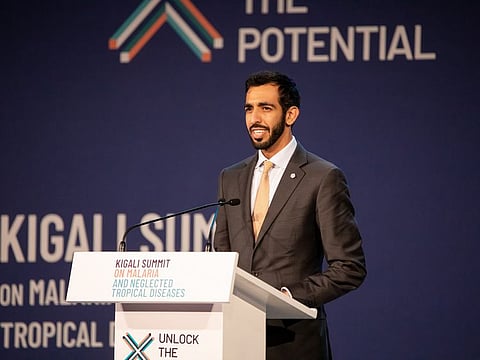UAE signs Kigali Declaration in Rwanda to fight neglected Tropical diseases
President: We will continue to pursue innovative ways to accelerate disease eradication

Abu Dhabi: In line with its decades-long leadership in global disease elimination efforts, the UAE has today reaffirmed its commitment by endorsing the Kigali Declaration on Neglected Tropical Diseases (NTDs) in Rwanda.
The signing was celebrated today during the Kigali Summit on Malaria and NTDs, hosted by the Government of Rwanda on the sidelines of the Commonwealth Heads of Government meeting. The summit convened global health leaders to highlight the urgency of ending malaria and NTDs, and to identify opportunities for better integration across disease elimination efforts.
Commenting on the signing of the declaration, President His Highness Sheikh Mohamed bin Zayed Al Nahyan, today tweeted: “In line with our longstanding commitment to helping those in need UAE signed Kigali Declaration on Neglected Tropical Diseases. We will continue to collaborate with international partners in pursuing innovative strategies to accelerate disease eradication efforts.”
High-level commitment
Sheikh Shakhboot bin Nahyan Al Nahyan, Minister of State at the Ministry of Foreign Affairs and International Cooperation, signed the Kigali Declaration on behalf of the UAE. Sheikh Shakhboot bin Nahyan represented President His Highness Sheikh Mohamed bin Zayed Al Nahyan, who launched the ‘Reaching the Last Mile’ initiative in 2017 in a bid to end river blindness and lymphatic filariasis in Africa.
Launched earlier this year on World NTD Day, the Kigali Declaration is a high-level political declaration that aims to mobilise political will, resources and action to end suffering from NTDs. The declaration focuses on country ownership of NTD programmes and stresses the importance of integration and cross-sectoral collaboration.
“Today represents another significant milestone in the effort to end NTDs, as we join global leaders in pledging to eliminate these diseases that are affecting millions of people in the world’s most vulnerable communities. Only through collaboration and partnership can we truly make significant progress on the journey toward ending these debilitating conditions. We are honoured to join the Government of Rwanda and our international partners to mark the next stage of that journey here in Kigali,” Sheikh Shakhboot bin Nahyan said.
Building on success
The Kigali Declaration builds on the success of the ground-breaking 2012 London Declaration on NTDs that ended this year and outlines a clear pathway to achieve the targets laid out by the World Health Organisation’s 2030 Roadmap on NTDs. Significant progress has been made on NTDs over the past several decades as a result of the collective work of donors, governments and partner organisations, with 45 countries having eliminated at least one NTD so far.
“The UAE is a long-standing champion of NTD elimination. We are proud to continue the legacy of our late founder, Sheikh Zayed bin Sultan Al Nahyan, and to reaffirm the commitment of our President, who believes that no one should suffer from a preventable disease. Much progress has been made on NTDs, and as a nation we are determined to continue to support elimination efforts and global movements such as the Kigali Declaration that can help raise awareness and mobilise resources. Our collective efforts will free communities from the burden of these devastating diseases while strengthening local health systems and securing a safer world for all,” Sheikh Shakhboot bin Nahyan added.
The Kigali Declaration was also signed by other heads of state, including Rwandan President Paul Kagame; Nigerian President Muhammadu Buhari; Prime Minister of Papua New Guinea James Marape; and Tanzanian President Samia Suluhu Hassan.
The declaration has been developed through a collaborative and iterative process that included inputs from ‘Reaching the Last Mile’, and other key partners such as Bill and Melinda Gates Foundation, the Carter Center, the END Fund, and several endemic countries.
Ending infectious diseases
The UAE and Abu Dhabi’s ruling family have been leaders in efforts to end infectious diseases for the last three decades, continuing the legacy of the late Sheikh Zayed, Founder Father of the UAE, who made a personal donation to Jimmy Carter’s Guinea Worm Eradication Programme in 1990.
The UAE and its leadership have also made significant contributions to global efforts to prevent and control malaria, a deadly infectious disease that disproportionately affects women and children, with donations to The Global Fund and the RBM Partnership to End Malaria. Through the Reaching the ‘Last Mile Initiative’, His Highness Sheikh Mohamed bin Zayed also launched Forecasting Healthy Futures in 2019, an innovative partnership with Malaria No More and several technology partners to advance climate-informed malaria policies and interventions.
Sign up for the Daily Briefing
Get the latest news and updates straight to your inbox






